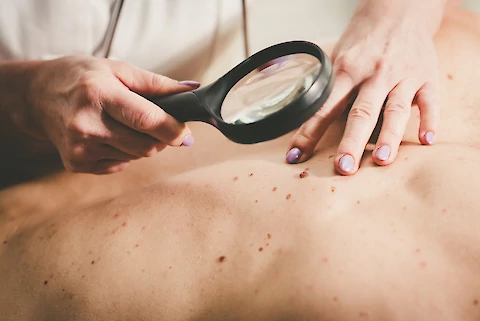
Melanoma is one of the most common types of skin cancer, and unfortunately, seniors are at a higher risk of developing it. As a family member or caregiver, understanding melanoma risk factors and care is crucial to ensure the health and well-being of your loved ones.
Senior Helpers Visalia has what you need to know about the increased risk of melanoma for seniors as well as common risk factors that can impact the entire family, such as genetics, location, and lifestyle.
Melanoma Risk Factors
A key aspect of melanoma prevention is understanding the risk factors that contribute to its development. One major risk factor is age. As seniors grow older, their risk of developing melanoma increases due to factors such as a weakened immune system and cumulative sun exposure. This makes it even more essential for seniors to have regular check-ups and skin screenings to catch any potential issues early on.
Genetics also play a significant role in melanoma risk. Having a family history of melanoma, as well as specific gene mutations, can greatly increase one's likelihood of developing this type of skin cancer. If you know that melanoma runs in your family, share this information with your loved ones and encourage them to be vigilant about their skin health.
Lifestyle choices can also raise the risk of melanoma development. Neglecting sun protection habits, using tanning beds, and engaging in outdoor activities without proper precautions can all contribute to a higher likelihood of melanoma.
Melanoma Care and Risk Mitigation
Armed with knowledge about melanoma risk factors, families can take necessary steps to prevent and detect this skin cancer early in its development. Prevention strategies include regular skin checks and screenings, both self-examinations and professional evaluations performed by a healthcare provider. Sun protection measures, such as applying sunscreen with at least SPF 30, wearing protective clothing, and avoiding tanning beds, can greatly reduce the risk of melanoma development.
Early detection is key in melanoma treatment, as it greatly increases the chances of successful outcomes. Keep an eye out for any changes in the appearance of moles or new skin spots, and consult a healthcare provider if you notice anything suspicious.
Treatment options for melanoma vary depending on the stage and severity of the cancer. Options may include surgical removal of the tumor, chemotherapy or immunotherapy to target cancer cells, and radiation therapy to destroy any remaining cancerous cells.
When caring for a senior recovering from melanoma, providing emotional support and encouragement is crucial. After treatment, seniors may need assistance with daily activities and medical appointments, as well as someone to monitor for any signs of recurrence or complications. Your support and care can make a significant difference in their recovery journey.
Senior Helpers Provides Resources for a Healthy Lifestyle
Understanding melanoma risk factors and the importance of prevention and early detection can make all the difference in ensuring the health and well-being of seniors and their families. We encourage you to take proactive steps in safeguarding your loved ones from this prevalent skin cancer.
If you live in Visalia, Hanford, Tulare, Kings County, or Tulare County and need assistance with senior care, contact Senior Helpers Visalia. Our compassionate and professional team is here to support you and your family throughout this journey.